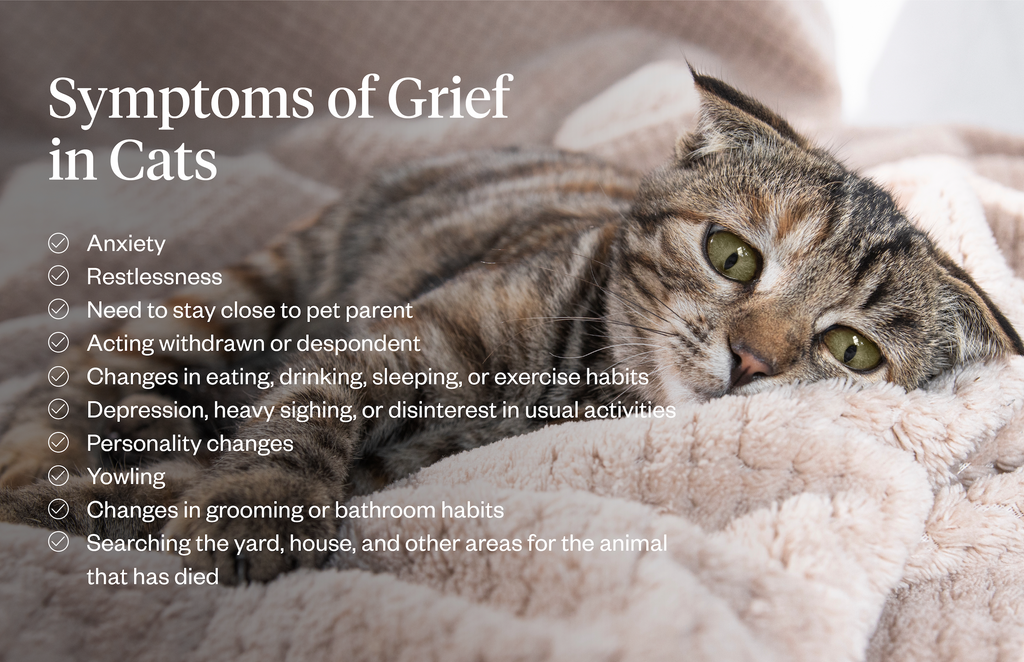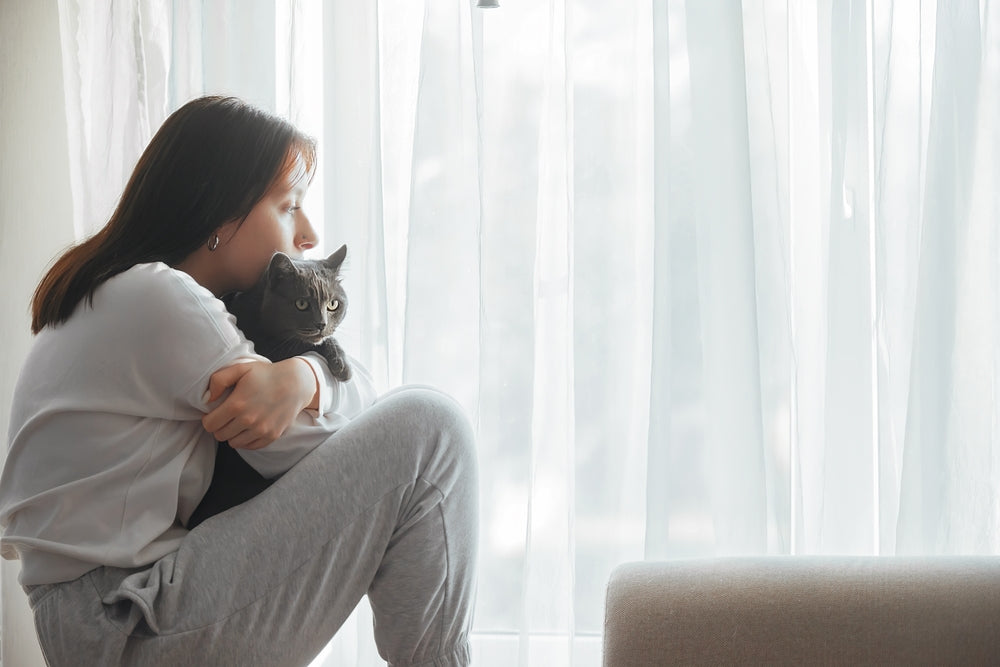9 Min Read
Do Cats Grieve?
Key takeaway

Why pet owners are switching to online vet care with Dutch
-
Prescriptions delivered free to you
-
Fast access to Licensed Vets over video
-
Unlimited video visits and follow-ups
Cats may be known for their independent and mysterious nature, but they often form deep and meaningful bonds with their human companions and other pets. Research and observations reveal that cats are not exempt from complex emotions associated with loss, like grief.
Do cats grieve? Do cats grieve when another pet dies? Beyond their stoic exterior lies a depth of feelings that can be triggered by various factors, such as the loss of a fellow pet, changes in their environment, or the absence of a familiar human presence.
Understanding cat grief requires pet parents to look for the subtle signs and behaviors that signify a cat’s response to loss. When faced with the loss of a companion, cats may undergo behavioral changes that signify a morning process. Keep reading to learn more about whether cats grieve and how you can help your cat through the mourning period.
Symptoms of Grief in Cats
How do cats grieve? Unfortunately, even though cats don’t speak your language, they still experience emotions. Do cats grieve for their owners? Do cats grieve other cats?
While their expressions of sorrow may differ from those of humans, cats can exhibit a range of symptoms that indicate they’re mourning the departure of a companion, whether it’s a fellow feline friend or a beloved human. Understanding these subtle signs is essential for pet owners to provide the necessary support during these times.

Here are common signs of grief in cats:
- Anxiety: Cats may display increased signs of anxiety, such as restlessness or unease. Changes in their environment or routine can contribute to a heightened level of stress.
- Need to stay close to pet parent: Grieving cats often feel a strong need to stay close to their pet parent. They may seek comfort through physical proximity and affection.
- Acting withdrawn or despondent: Cats may act withdrawn or despondent, distancing themselves or hiding from usual activities and interactions. This withdrawal is a coping mechanism for processing their emotions.
- Changes in eating, drinking, sleeping, or exercise habits: Grief can manifest in alterations to daily habits, including eating, drinking, sleeping, and exercise. Cats may experience disruptions in their usual routines.
- Depression, heavy sighing, or disinterest in usual activities: A grieving cat may exhibit signs of depression, including disinterest in activities that once brought them joy.
- Personality changes: The loss of a companion can lead to shifts in a cat’s personality. They may become more subdued, less playful, or exhibit changes in behavior.
- Yowling: Some grieving cats may vocalize more than usual, expressing their distress through yowling or meowing. This can be a cry for attention and comfort.
- Changes in grooming habits: Grieving cats may alter their grooming habits. Some may groom excessively as a form of self-soothing, while others may neglect their grooming routine.
- Searching the yard, house, and other areas for the animal that has died: Cats may engage in searching behaviors, exploring the yard, house, or other areas in an attempt to locate the missing companion. Their behavior reflects their difficulty in accepting the absence.1
How Do You Help a Grieving Cat?
Grieving is a complex and individual process, and when it comes to cats, understanding their unique responses to loss is essential for providing effective support. Cats may express grief in ways that require a keen observer. As a responsibility, pet parents should adopt strategies that cater to a cat’s emotional needs during this time, such as:
Provide a safe and comforting space
Cats may seek solitude when dealing with anxiety or grief. In response to loss, a cat may retreat to find a quiet and secure space. As a pet owner, you can facilitate this need by creating a dedicated sanctuary space within your home. This space should be equipped with a comfortable bed, soft blankets, or an item of clothing that carries your scent. The familiar and safe environment helps your cat find solace during moments of distress.
You can also place familiar toys or items associated with the lost companion in the designated space. While this may evoke memories, it also provides a connection, potentially helping the cat understand and accept the situation.
Maintain routine and stability
Cats are creatures of habit. When faced with the loss of a companion, maintaining a stable and predictable environment becomes even more important.1 Changes in routine can amplify stress, so strive to adhere to your cat’s regular schedule as closely as possible. This includes feeding time, play sessions, and other daily activities.
While it’s understood that the dynamics in the household may have shifted, try to keep disruptions to a minimum, especially in the initial stages of grief. Consistency provides a sense of normalcy, reassuring your cat that some aspects of their life remain constant. If any adjustments are unavoidable, introduce them gradually to allow your cat to adapt without feeling overwhelmed.
Offer physical comfort
One way to treat anxiety in cats is to offer physical contact. During periods of distress, your cat may seek increased physical closeness. Spend quality time engaging in gentle petting, cuddling, or simply being present.
Pay attention to your cat’s cues during these interactions. While some cats may actively seek affection, others may prefer a more passive presence. Respect their boundaries and let them dictate the level of physical contact they’re comfortable with.
Engage in activities
While grieving, a cat may experience fluctuations in energy levels and interest in play. Some cats may engage in play as a form of distraction, while others may show a temporary disinterest. Pay attention to your cat’s cues and provide opportunities for playing and learning. Interactive toys, such as feather wands or puzzle feeders, can serve as good distractions.1
Monitor changes in behavior
Grieving cats may exhibit changes in behavior, and it’s essential to closely monitor them. While some level of behavior change is expected during the grieving process, escalating signs of distress warrant further investigation and professional guidance.1
Look for signs like lethargy, excessive vocalization, changes in litter box habits, or avoidance behaviors. If you see any concerning behaviors, consult your vet for guidance. In some cases, anxiety medications or specific behavior modification techniques may be recommended to help your cat cope with the emotional challenges of grief.
Be patient and understanding
Patience is a key virtue when helping a grieving cat. Understand that the process of healing takes time, and each cat progresses at their own pace.1 Avoid rushing or forcing your cat to move on from their grief. Instead, be a patient and compassionate presence, offering support when they ask for it.
Cats may display subtle signs of grief that are easy to miss, and their healing journey may involve good and bad days. Allow your cat the space and time they need to come to terms with the loss. Be patient with any changes in behavior, and avoid unnecessary stressors during this delicate period.
FAQs
How long do cats grieve for?
How long cats grieve for varies based on factors like their relationship with the departed and their ability to adapt to change. Grieving is a natural response to loss, and while some cats may show signs of recovery in a matter of weeks, others may take several months.
Signs of grief can include changes in behavior, appetite, or energy levels. It’s crucial for pet parents to be attentive to their cat’s needs during this period, providing comfort, routine, and understanding. Creating a supportive environment and allowing the cat to express their emotions at their own pace contributes to a smoother grieving process.
Do cats grieve the loss of their owner?
Cats often form strong bonds with their owners, and the loss of a human family member can lead to grief in cats. The extent of their grief may vary based on the depth of the bond and the cat’s individual personality. Cats are perceptive to changes in household dynamics and may exhibit signs of distress, confusion, or even depression when their owner passes away.
To support a grieving cat after their owner has passed away, maintain their routine, offer physical comfort, and create a calm environment that makes them feel safe. Understanding the cat’s emotional needs and providing reassurance can support their healing process.
What happens before a cat dies?
The events leading up to a cat’s death vary based on the cat’s age, health condition, and circumstances. In some cases, cats may show signs of decline, including changes in appetite, energy levels, or grooming habits. Elderly or terminally ill cats might experience weight loss and increased lethargy. Behavioral changes, such as seeking solitude or changes in social interactions, may also occur.

Final Notes
Addressing grief in our feline companions is a responsibility that comes with being a pet parent. Cats experience a range of emotions when faced with loss. Recognizing the subtle signs and providing tailored support during their grieving process is crucial for a healthy healing process.
If your cat experiences extreme behavioral changes like anxiety, destructive behaviors, or excessive vocalization, talking to a vet can provide you with answers and a potential treatment.
For revolutionary pet care solutions, try Dutch. With a Dutch membership, you can get unlimited access to licensed vets, free prescription delivery to your doorstep, and unlimited follow-ups to ensure the best care for your cat.
Share
References
-
Characteristics of Grief in Companion Animals, www.lsu.edu/vetmed/veterinary_hospital/grief_in_companion_animals.pdf.
